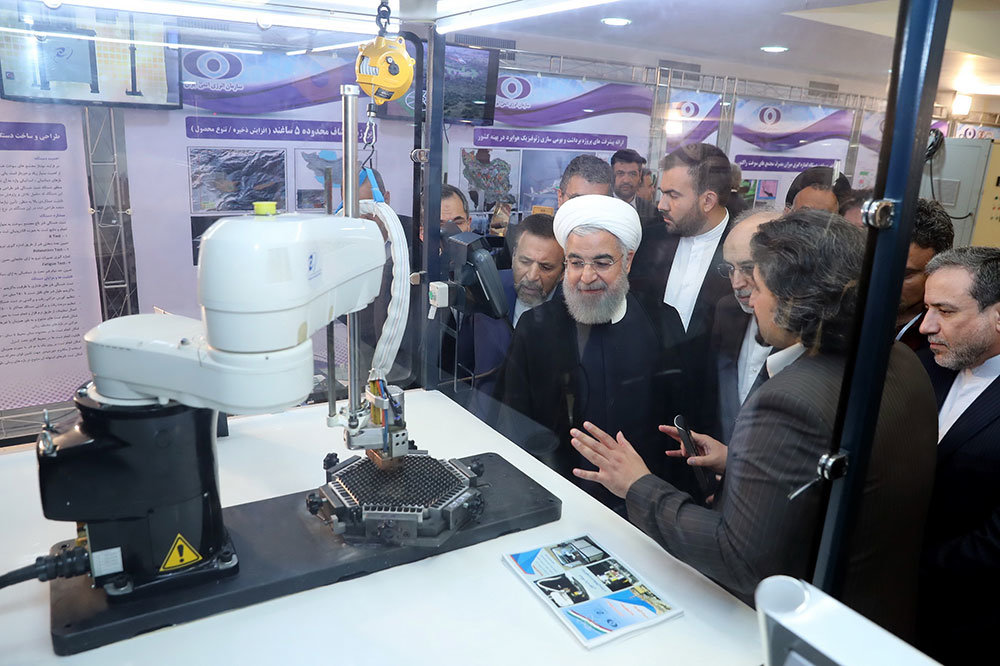Iran unveils 83 achievements in nuclear technology

TEHRAN - During a ceremony on Monday marking National Day of Nuclear Technology, 83 technological developments in nuclear industry were unveiled at the presence of President Rouhani and number of other cabinet members including Ali Akbar Salehi, the vice president and the chief of the nuclear energy organization.
Rouhani and those accompanying him at the ceremony inspected a number equipment used in the nuclear industry.
At the ceremony, Rouhani, through a video conference, also issued an order for transfer of the yellowcake produced in the Ardakan factory in Yazd to the uranium conversion facility (UCF) in Isfahan.
According to reports, the material was extracted from the Saghand uranium mine in Yazd province.
The move is apparently taking place for the first time since Iran agreed to curb its nuclear activity in 2015 in return for the removal of nuclear sanctions.
‘Nuclear technology in Iran on verge of fundamental jump’
Talking at the ceremony, Salehi said nuclear technology in Iran is on verge of a fundamental development.
Many activities have been carried out to optimize and renew equipment in this “strategic industry”, Salehi, a nuclear physicist, told the ceremony.
He added that new achievements have been reached in the area of quantum technology which are highly valuable from a strategic point of view.
Commenting on the JCPOA, the official for the nuclear agreement between Iran and great powers, Salehi said Iran has remained fully committed to its obligations under the international deal and this has been confirmed by the International Atomic Energy Agency for ten times.
In an indirect reference to the U.S. which has so far violated the spirit and letter of the agreement, Salehi said it is not acceptable that one side take all the responsibility for implementing the deal and the other side refrains from fulfilling its legal commitments.
U.S. will ‘regret’ if it scraps nuclear deal, Rouhani warns
Talking on the sidelines of the ceremony, Rouhani said the United States will “regret” if it ditches the 2015 nuclear deal, officially known as the Joint Comprehensive Plan of Action (JCPOA).
“We will not be the first who violate the JCPOA. However, they will regret if they violate the deal,” Rouhani asserted in an indirect reference to U.S. President Donald Trump.
Iran has threatened to resume enriching uranium to the purity level of 20 percent in four days if the nuclear deal is abrogated.
“Our readiness is more than what they think,” the president said.
“They will see the consequences in less than one week if they renege on their promise,” he added.
Rouhani also said Iran does not need anyone’s permission for nuclear research and technology. However, he said, Iran is ready for interaction and cooperation with the world.
Pointing to 120 technological achievements in the nuclear field since the signing of the nuclear agreement, Rouhani said the progress of Iran’s nuclear technology has not been slowed down.
Elsewhere, he said that the structure of the JCPOA is so strong that 15 months of unrelenting attacks by the U.S. president have failed to shake it.
“We have made preparations for all the possible scenarios. If the JCPOA stays or not, with the U.S. or without it, we are prepared. There will be no problem for our technology and our people’s lives. Our people are more patient than what they imagine,” he stated.
In a statement on January 12, U.S. President Donald Trump gave Europeans only 120 days to agree to an overhaul of the nuclear agreement. He threatened if the text of the nuclear deal is not revised he would unilaterally withdraw the U.S. from it. The deadline falls on May 12.
Rouhani added, “Our path is clear. We do not care about threats. Our capabilities, even the military ones, are not for aggression. Our relations with the neighbors will be friendly. Those who say unfair and wrong things will understand that those words do not benefit them.”
He also said that Iran’s missile program is just defensive.
“Our weapons are not for aggression against the neighbors. We want all the regional countries to be together as one great regional power and solve problems together.”
PA/PA
Leave a Comment